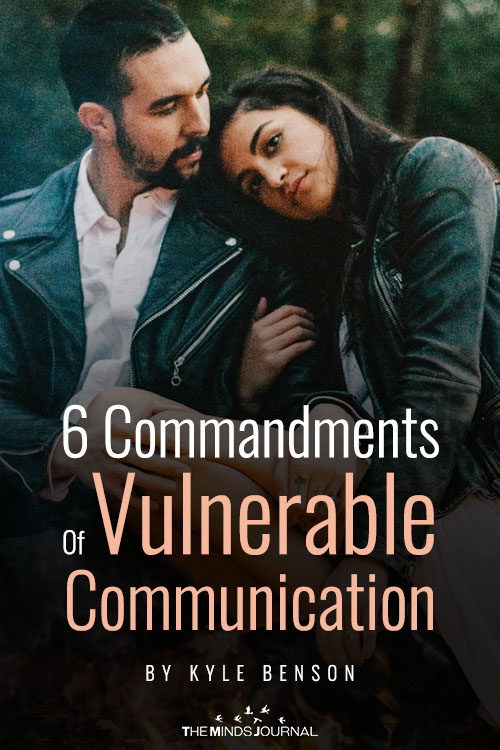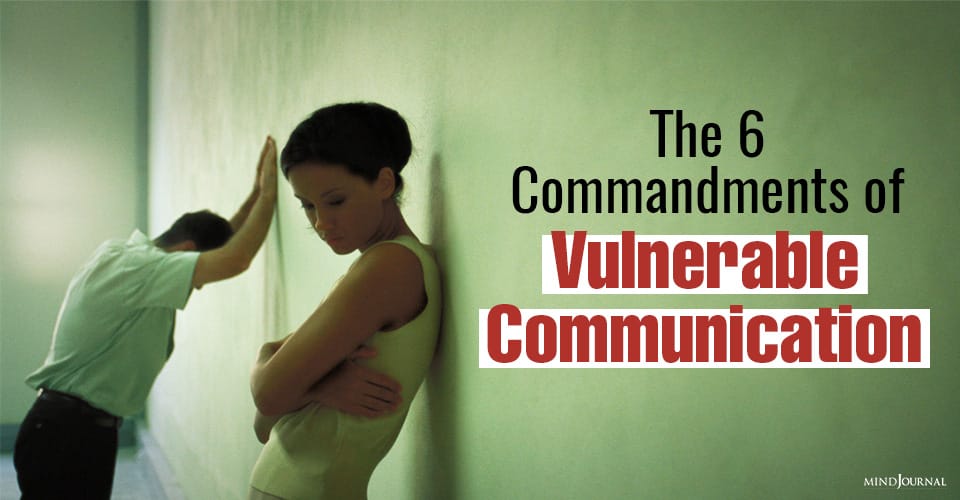Allowing yourself to be vulnerable in communication might increase misunderstandings.
Our worries can emotionally hijack our brains. They can entirely consume our thoughts in an endless vacuum of fear.
Opening yourself up, exposing who you are and what you need can be scary in our society. We were raised to be quiet; to not be too loud or crazy. We are expected to not draw attention to ourselves, to act like everyone else.
For me, that required stuffing our feelings deep down inside and plastering a mask on our face that says to the world, “I’m really happy.” Underneath that stuffing, the plaster is hardened to protect the world from seeing the frustration, confusion, and feelings of neglect.
The other day I was asked, “should I bring up every issue from my past relationships right away?” For some of us, this is only a trashcan full of baggage. For others, it’s a landfill of anxiety the size of Texas.
If you’re like the latter, this would mean expressing every single worry and doubt that crosses your mind. She just laughed at that guy’s joke. Is he funnier than me? In your mind, this forms day-mares of her running into this jokester’s arms and falling in love with him. You left behind.
Realistically, this is very unlikely. Your fear is a result of your distorted perception of your own value, and your self-esteem. If you have low self-esteem, you may see a relationship as a fragile thing- like a vase teetering on the edge of a table.
The more you suppress your concern and the more you allow your theories to nab your thoughts, the more your worries and fear will bottle up. One day, one of these worries will become unmanageable – like a Mento falling into your coke bottle of carbonated emotions.
Eventually, all that suppression is going to explode with such intensity that they won’t be able to even see where this came from. Your emotional explosion does not match the natural emotional response for such a problem.
This ridiculous reaction causes your partner to think you’re crazy. It’s impossible for them to know about all of your bottled up frustrations that lead to this point.
Related: 12 Important Life Hacks To Improve Communication In Your Relationships
The solution to spewing a liter of emotions on your partner over a can-sized issue is to express your emotions the moment that they happen. Typically, if you expose things that are bothering you the moment they start and receive a positive response, your worries do not get worse.
When problems arise in any kind of relationship, it is a result of clashing emotional blueprints of expectations within the relationship. There is not a single person that sees the world the same way that you do.
The secret to understanding each other better seems to come not through an increased ability to read body language or improved perspective-taking, but rather, through the hard relational work of putting people in a position where they can tell you their minds openly and honestly.1
The way to get your needs met and deepen understanding and the quality of your relationships is through this very scary thing called vulnerability. It’s the willingness to open oneself and expose your true intentions, fears and desires.
“Owning our story can be hard but not nearly as difficult as spending our lives running from it. Embracing our vulnerabilities is risky but not nearly as dangerous as giving up on love and belonging and joy—the experiences that make us the most vulnerable. Only when we are brave enough to explore the darkness will we discover the infinite power of our light.” – Brene Brown
6 Commandments of Vulnerable Communication
1. You come first.
If you’ve ever taken an airplane, you’ve heard the flight attendant telling you to put on your oxygen mask first before helping others.
Despite most of us ignoring the procedure details, it is a matter of life or death. If you choose to help someone else before you help yourself at that altitude, you will most likely pass out and die since the air has such little oxygen. Not only will you pass out and die, but so will the person you are trying to help.
This lesson doesn’t just apply in the air; you must care about yourself before you care about others. If you end up hurting yourself by suppression, you hurt your partner by deeming them incapable of truly making you happy and helping you get your needs met. As a result, you get hurt even more, and you neglect their needs in the process.
You and your partner are one emotional unit. So when you are taking your needs into consideration, you are also taking care of your partner’s needs.
2. No blame game.
If you make your partner feel incompetent, inadequate or selfish, they will withdraw. Being vulnerable is not about accusations or highlighting your partner’s shortcomings. That leads to a dueling match birthed by insecurities.
Remember, when emotions become tense, intellect becomes non-sense.
Using vulnerable communication when you’re really pissed off will cause you to sound angry and use judgmental language.
When something bothers me, I tell my partner how I feel. To do this, I need to calm down and process how to frame my emotions in a way that won’t attack them. When I do address my needs in a calm manner and express the emotions I am feeling rather than the faults, my partner and I get closer.
3. Use verbs
…that express the emotions you are feeling such as need, feel, or want. This focuses on what you are trying to accomplish rather than your partner’s shortcomings. “I feel like you don’t care when you don’t text me for 3 days. I need to feel that you care about me.”
Related: 8 Ways to Break the Distancer-Pursuer Communication Pattern
4. Be detailed.
If you talk to your partner in generalities, your partner is going to miss what you really need, thus lowering the chance that he or she will get it right.
Say precisely what is bothering you. “Last night you said you loved me and then you took it back. That made me feel inadequate.”
5. Be completely honest and genuine about how you feel.
Your feelings are very real and they should be addressed. At times they can be distorted, but feelings have a purpose. It’s your unconscious trying to communicate with you in an effort to protect you. Don’t ignore them. If you’re feeling an emotion, there’s a reason for it.
After being involved in multiple bad relationships, I developed a fear that committing to a relationship would cause more pain. So my emotions became defense mechanisms so I would be protected from being hurt again. I’d find myself really liking a girl, only to find myself suddenly indifferent. Unconsciously, I was pushing her away so I wouldn’t be hurt or risk myself.
Since I was aware of this, I would tell the woman I dated about this and ask that she be understanding. This tends to deepen a relationship.
6. Be unapologetically assertive.
Your needs matter. They are valid. You’ll date various partners with different attachment styles, and some of them may see your concerns as illegitimate such as avoidants, but as the authors of Attached point out, your needs are the foundation for your happiness.
Being assertive of what you need is crucial, especially for people with an anxious attachment style. According to the authors of Attached, it’s easy to fall into because the culture we live in shames us for our needs and makes us feel illegitimate in the process.
Whether your needs are legitimate for someone else or not is besides the point. They MATTER for YOUR HAPPINESS. Therefore, they are legitimate.
Vulnerable communication is done in secure, healthy relationships, and it also creates secure, healthy relationships.
Action Steps
It’s important to resist the temptation of indirect methods of trying to get your needs met (such as making your partner jealous). I highly recommend anyone who is struggling to feel secure in a relationship to write down how you feel.
Not only will this make the story in your head more clear about your desires, but it’ll help you get over the fear of having cold feet or forgetting what you need to say. It will make it easier for you to talk to your partner with confidence.
Ask yourself:
1) What am I feeling? What specific events make me feel this way?
2) What specific actions by my partner would make me feel better (your positive need)?
The difference between vulnerable communication and non-vulnerable communication is clarity. Vulnerable communication only has one meaning, but non-vulnerable can be interpreted in multiple ways. In Attached, the authors demonstrate the difference between fuzzy communication and vulnerable communication
Examples:
Note: Vulnerable communication is not the answer to all of your problems. If you have low self-esteem, vulnerability can drastically boost your self-esteem and decrease neediness. But if you continue to suppress yourself and see yourself as unworthy due to bad belief systems then you’ll struggle even in healthy relationships.
Related: How Chronic Stonewalling Imprisons A Relationship
Individuals “who are troubled by low self-esteem might project their self-doubts onto their partners, leaving them uncertain of the constancy of their partners’ affections. As a result, occasional self-doubts or personal failures might turn into relationship insecurities.” 2
As Brene Brown highlights, true belonging in relationships only happens when we share our authentic, imperfect, and vulnerable self with our partners. The paradox is belonging can never be more than accepting yourself. When you accept yourself, you bravely ask for what you need and want. And that courage deepens your relationships with your partner and yourself.
If you want to transform conflict into material to build a stronger and more connected relationship then read Kyle Benson’s conflict blueprints here.
References:
Book: Mindwise: Why We Misunderstand What Others Think, Believe, Feel and Want by Nocholas Epley (2014) Pg. 183 ↩ Murray, S.L., Holmes, J., MacDonald, Ellsworth P., (1998) “Through the Looking Glass Darkly? When Self-Doubts Turn Into Relationship Insecurities. Journal of Personality and Social Psychology, Vol.75, No.6, 1459-1480. ↩
Written by Kyle Benson Originally appeared in Kyle Benson










Leave a Reply